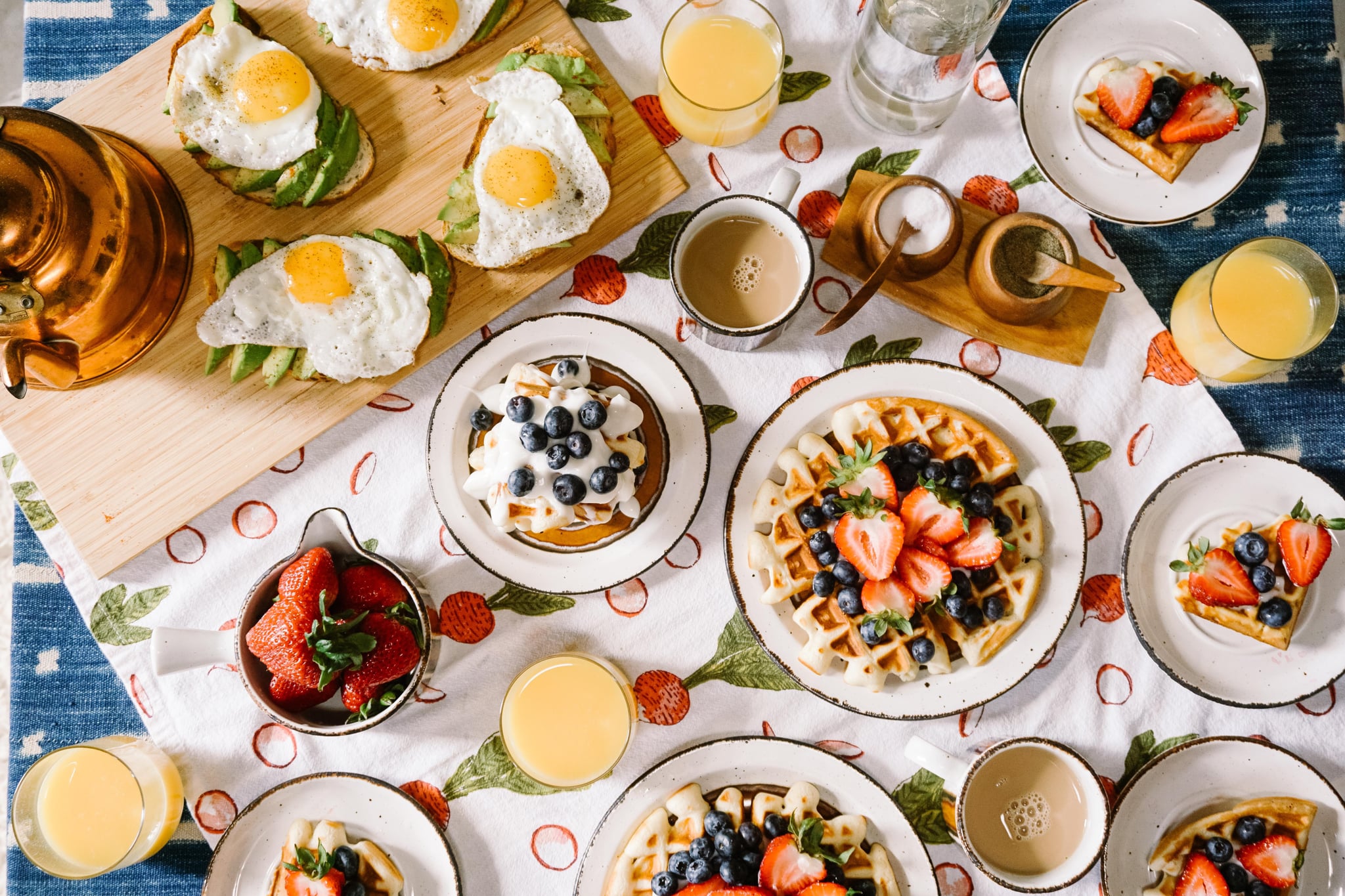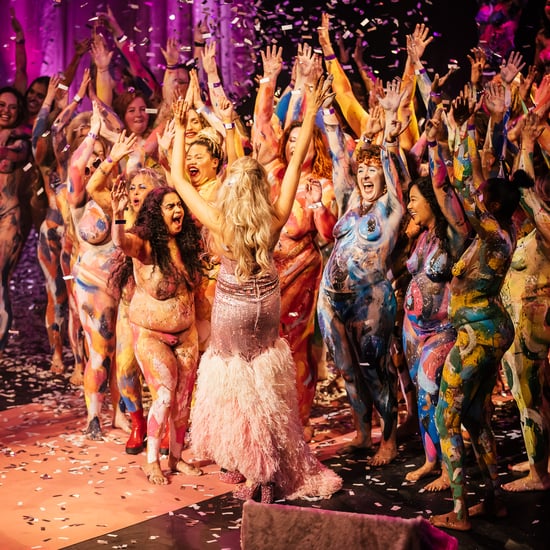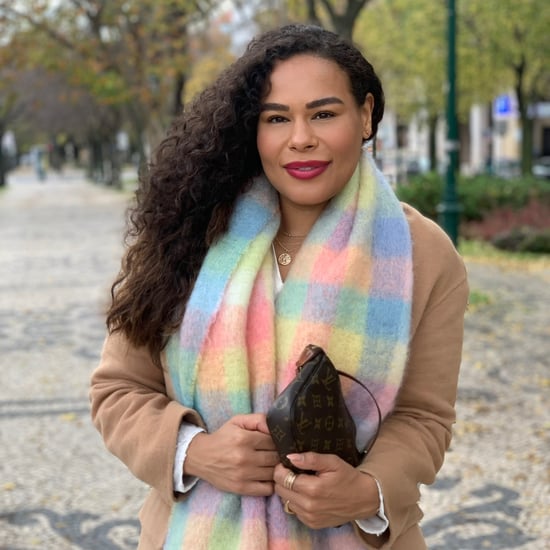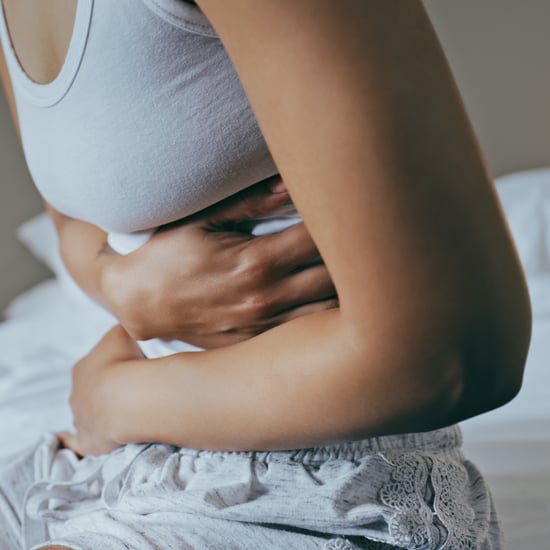How the Pandemic Impacted My Relationship With Food
How Staying Home During the Pandemic Began Healing My Relationship With Food

I've always had a tricky relationship with food. I vividly remember comparing myself and my changing body (thanks, puberty!) to my peers in elementary school. I have always finished my meals (including second and sometimes third servings), not because I was encouraged to do so or because I was still hungry but because it was there. I absorbed society's harmful rhetoric of "good" and "bad" food early on and assigned each meal its respective category — a cupcake on someone's birthday, though I rarely stopped myself from eating it, came with a later shame.
By high school, I was on and off diets (Paleo, carb-free, sugar-free — you name it!) while intensely working out five times a week. On the surface, I wanted to "stay in shape" to stay competitive on my school's rowing team. Internally, I primarily focussed on the way my body was shaped, what I wore (even my school uniform was up for critique and comparison), and how I looked in it. To this day, when I look back on my senior year, I first remember my packed-lunch salads and losing weight — something I was very proud of at the time.
I went to college, stopped rowing, and ate whatever I wanted. In fact, food became a free-for-all. The dining hall meant eating mass-prepared food, and no one — including coaches, teammates, and family members — was watching over my shoulder. Of course, my body changed (as it should have and is perfectly OK!), so back on the diets I went. I moved into my apartment junior year with raw, unsalted cashews as my only snack. I knew something needed to change a few weeks later when I still couldn't offer anything else to my friends when they came over. I just didn't have the language to speak up.
That changed two years later. As I was home and finishing school during the COVID-19 pandemic, a friend recommended Caroline Dooner's The F*ck It Diet. I read the book in awe and began searching for more materials on antidiet practices. I finally picked up Sonya Renee Taylor's The Body Is Not an Apology, a book I had on my nightstand for a while by then, and I fell in love with her call for radical self-love. Piece by piece, I began unlearning the toxic messageing our society loves to enforce.
There was no one outside of my quarantine bubble to see me, so instead, I began to notice myself feeling thankful for all my body was doing for me — including keeping me healthy and manageing my overloaded stress levels — rather than comparing it to others. Eating and cooking became a time to spend time with loved ones. In fact, food became a comfort.
Christyna Johnson, MS, RDN, LD, told POPSUGAR there is nothing wrong with finding comfort in food, but it is important to also find comfort in other things: perhaps watching standup comedy, curling up in warm blankets and a book, or spending time in nature.
"Having unconditional permission to eat is really important so that you can remember: 'I'm allowed to do this.' It's just, hopefully, I have other skills that I can draw on. There's no wrong in that particular situation," Johnson said.
At the end of the day, food has no morality, meaning there is no such thing as "good" or "bad" foods. Johnson explained "there's no food that is absolutely good with no flaw. All food is food. It provides you with something."
"There's no food that is absolutely good with no flaw. All food is food. It provides you with something."
Dooner, the author of The F*ck It Diet, agrees. "The more chaotic or restrictive our relationship with food is, the more our bodies will seek out food for comfort," Dooner told POPSUGAR. "For lack of a better term, the more we diet, the more effective dieting becomes as a 'drug,' and the more neutralised food is, the less likely we will use it as a 'drug' — but even still, using food to comfort is A-OK as long as we generally also have other ways to soothe and unpack our emotions."
Food is a source of pleasure, connection, and nourishment, explained Kimmie Singh, MS, RD. We should strive for a balance between the three. Right now, thanks to the nature of the pandemic, the pleasure aspect feels that much more important.
"I know it can be really tough, but I think the more guilt that [people] feel around having more pleasure of food is also going to make it harder to even get the connection and nourishment at all because sometimes that guilt can really make us feel a bit less present and could make things feel more chaotic overall," Singh told POPSUGAR.
For some, this is a good time to begin healing their relationship with food and listening to hunger cues, Dooner told POPSUGAR. "A lot of us have more time at home and flexibility with meal and snack times and lots of stretchy clothes." That said, Dooner shared many people are also reverting to old diet coping mechanisms such as cutting out food, compulsive exercise, and weight-loss attempts.
"When life gets chaotic, and when we don't have much control, we try and cling to whatever control we can find," Dooner said.
Singh found this realisation hit a lot of her clients at different points throughout the pandemic, especially when they were losing a job or worried about their loved ones. Instead of the usual distractions, they were forced to face their relationship with their bodies now that they were often home without access to their gym, usual foods, and forms of pleasure and stimulation.
"We had no choice but to look at how we were relating to food. Either they weren't quite ready to wake up diet culture, which I understand and I have compassion for, or they had no choice but to wake up the diet culture and realise this isn't working," Johnson added.
Johnson said she is getting significantly more clients whose relationship with food is distorted rather than those with a disorder of eating. To her, it was predictable that people with eating disorders were going to struggle more, and that those on the cusp of one could be kicked into the eating disorder. "Anyone that had a wonky relationship with food would have to look at the fact that they had a wonky relationship with food, because we're all home and we don't have any choice but to look at what we're doing," she said.
Access to Food Is Essential to Intuitive Eating
Food scarcity, a predictor of disordered eating, feeling "addicted" to food, and binge eating, according to Dooner, has had a large role in this increase over the last few months of the pandemic. With grocery store shelves wiped clean and restaurants closed earlier in the pandemic, many people didn't know when they'd have access to certain foods again. Even then, people became afraid of exposing themselves to the virus in the grocery store or by bringing products into their homes.
Johnson explained that with the pandemic, little changed in the lives of people who've lived with food insecurity for a long time. If anything, they just potentially became more food insecure, she said. On the other hand, for the first time since the Great Depression, we had people who were not previously food insecure struggle to find store shelves bare, changing their understanding of the food landscape.
Johnson said everyone, regardless of socioeconomic status, has the authority to be an intuitive eater, but the issue is the system that's occurring. Even the ability to go to multiple grocery stores comes with "a lot, lot, lot" of privilege. "So sitting with that and figuring out what that means for you as a person and understanding that if I do not have access to the things that I need, the food that I need, that's creating this sort of halo around it in my mind. Now it's this extra-special thing," Johnson explained.
This makes people more likely to feel out of control. There is a perception that this is going to be the last time one can access it, so it must be savored and not wasted. "It sets people up for bingeing, and that really tends to disrupt people's relationship with food," Johson continued. "It's a hard spot to be in."
"I hope that anybody who's reading this or learning about this can really acknowledge that they're worthy of that support."
With this newfound stress also came a newfound guilt. "What I find is that for a lot of people, there's so much shame around that. So taking the first steps to get more support, maybe go to a food pantry or a client preventative. It can be hard to take that first step," Singh said. "I hope that anybody who's reading this or learning about this can really acknowledge that they're worthy of that support."
Johnson has long called diet culture "the great distractor." She explained that it works by keeping people focussed on themselves rather than "loving our neighbour to the best of our ability, because we're so concerned about how we look to our neighbour."
When food is simply food, it is not the biggest issue we have going on right now, she added. It only feels like that because it is the easiest thing to distract ourselves with. When we are concerned with how we look, if we are fit enough, or if our curves are in the right places, "our ability to care about the things that are harming other people is very dampened," added Johnson. Instead, if we accept our body is just a body that will help us, we can turn outwards to see how we can impact change. "We can do it full force because we're not concerned with how we look in the middle of our social justice," Johnson added.
Moving Forward By Trusting One's Body
For those confronting their relationship with food right now, whether for the first or not, it comes down to trust.
"They can trust their bodies to tell them when they need pleasure. Once food is safe to access for that pleasure or when they need something else and really leaning into trusting their body when it feels safe to do so. . . it's such a great guiding post for this work. And then also taking that extra support if you need to, especially when it comes to access to food and access to other resources that can make life easier," explained Singh.
As Dooner explains in the book, a big way we learn to relate to food is through the way our family relates to food whether they were on diets and afraid of gaining weight or they showed love through cooking. For the many back home right now, doing so around close family members can be difficult.
Johnson recommends creating community, "even if it can't be your family of origin, your chosen family, or whoever you're living with at that time" to regularly talk about "so that you're not feeling like an island and questioning whether you're doing the right thing for yourself." This sort of community can be one of the most helpful things someone can do because it reminds them they have the authority to make their own decisions. Also, "it can help you remember that the people you're living with are individuals, and they have their own journey that they need to go on as well," shared Johnson.
"I'd rather your body change over the course of a pandemic than to not have you survive it at all."
As for me, those books as well as the many other resources I dived into didn't fix my relationship with food. They simply started my journey by opening my eyes to the possibility of more. I'm unlearning the need to finish each bite on my plate, which was only my body's reaction to my own food restrictions all along. I'm accepting that my body cannot do the same workouts I did in high school, and that is certainly not worthy of shame. I'm remembering what my body has brought me through and constantly thanking it for doing so.
I'm also reminding myself that this is 2020, after all. Thanks to a global pandemic, I finished my senior year of college from home and virtually graduated via a 15-minute pre-recorded video. By mid-May, I found myself unemployed and on a full-time job search when I started this antidiet and intuitive eating journey. This year continued to worsen with the killings of George Floyd, Rayshard Brooks, Tony McDade, and so many more Black lives as well as the following protests against racial injustice and police brutality shedding light on the earlier killings of Breonna Taylor, Ahmaud Arbery, among others. Followed by the forever-long election, a plummeting economy, and a surge in coronavirus cases (to say the least), this year certainly hasn't gotten any easier.
"We are doing the best that we can with what we have, sincerely. We are watching people try to figure it out in real time," said Johnson. "The thing that I would really love people to remember is that I'd rather your body change over the course of a pandemic than to not have you survive it at all."






